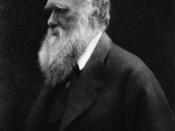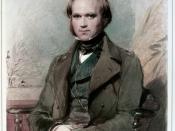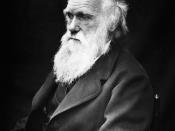Charles Darwin (1809-1882) was born in Shrewsbury, England. He was a man of extraordinary patience and humility. Darwin's Theory of Evolution is the widely held notion that all life is related and has descended from a common ancestor: the birds and the bananas, the fishes and the flowers -- all related. During his tenure as a student at Cambridge, Darwin's professor John Stevens Henslow (1796-1861) recommended Darwin to Captain Robert FitzRoy (1805-1865) of the HMS Beagle, who was in need of a naturalist.
British naturalist Charles Darwin (1809-1882) began drafting Origin of Species in 1842, just six years after returning from his fateful five-year voyage aboard the HMS Beagle (1831-36). Heavily influenced by Sir Charles Lyell's Principles of Geology (1830-1833, a three volume work) and Thomas Malthus' An Essay on the Principle of Population (1798), Origin of Species was ultimately published in 1859. In Origin of Species, Charles Darwin introduced the concept of natural selection.
Natural selection is a natural process which acts to preserve and accumulate minor advantageous variations within living systems. Suppose a member of a species was to develop a functional advantage (a reptile grew wings and learned to fly); its offspring would inherit that advantage and pass it on to future offspring. Natural selection would act to preserve the advantageous trait. Darwin made a keen observation but he drew a poor conclusion. He thought that since natural selection can and does produce slight variations within animal populations it should therefore be able to explain all of the variety we observe in biology. He concluded that since natural selection explains variety, all life must somehow be related, everything ultimately having evolved from some sort of common ancestor. Such analogy would lead to one step farther, to the belief that all animals and plants are descended from...


